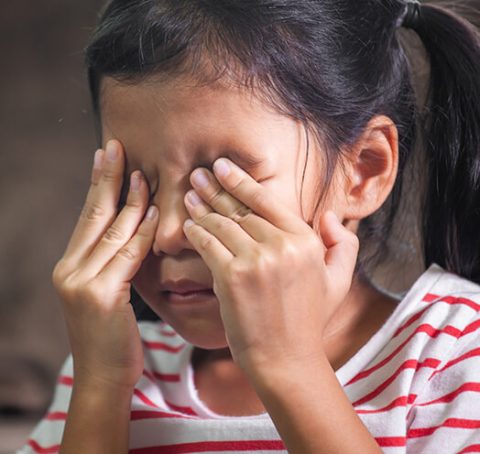Posted by: Eye Centers of Florida in Eye Health
6 Myths About Children’s Eyes That Every Parent Needs to Know

We live in an age of information — and misinformation. Myths about health care spread across the internet every day, and it can be difficult to know what to believe. As a parent, we understand that you want to do the best for your family’s health, and that means being able to distinguish between myths and the truth.
We’ve taken some time to debunk 6 myths about children’s eye care so parents know what to believe — and what not to believe — when it comes to kid’s eye health.

Myth #1: Pink Eye Only Happens in Young Children
Due to being in close contact with other kids at daycare or preschool, young children are especially susceptible to contracting pink eye. While pink eye seems to be most common in young kids, it can also affect preteens, teenagers, college students, and adults. This is especially true for those who don’t clean their contacts properly or practice recommended eye and eyelid hygiene.
The best way to keep your family members from contracting pink eye is to instruct everyone to practice good hygiene by washing their hands, not touching their eyes, and using clean towels when washing their face.
Myth #2: You Need Antibiotics to Treat Your Child’s Pink Eye
Many parents believe that pink eye needs to be treated by antibiotics, but antibiotics are rarely needed to treat this condition! Most cases of pink eye are caused by allergies or a viral infection and will clear up on their own within one to two weeks. Only when pink eye is caused by severe bacterial infections, which is far less common, will antibiotics truly be necessary.

Myth #3: The Sun Is Bad for Your Child’s Eyes
While long-term exposure to the sun can increase the risk of UV damage to your eyes, some studies suggest that the sun is necessary for healthy visual development! The risk of developing myopia (nearsightedness) can be higher for children who spend less time outside in the sun.
So, make sure that your kids spend plenty of time outside on sunny days, but remember to protect their eyes with UV-blocking sunglasses. This will help reduce their risk of developing myopia, while also protecting their eyes from damage.
Myth #4: Blue Light is Damaging to a Child’s Vision
Kids these days are spending more and more time interacting with technology. Back-lit screens emit blue light, which can have effects on your sleep cycle and can cause headaches; however, contrary to what you might read on the internet, it won’t damage your children’s eyes. We’re actually exposed to much more blue light from the sun than from electronic screens.
Spending more time outdoors and less time on devices can help reduce the risk of worsening nearsightedness. But, when your kids do spend time with technology, make sure that they take frequent breaks so that they don’t develop headaches, dry eye, temporary blurry vision, or irregular sleeping schedules.

Myth #5: Vision Loss Only Happens to Adults
Many people falsely believe that vision loss only happens to adults, but children are also at risk of suffering from permanent vision problems. This is especially true for children with amblyopia (lazy eye), which occurs when one eye has reduced vision due to the brain and eyes not working together properly. Contrary to popular belief, amblyopia isn’t always noticeable, and without treatment, it can cause vision loss.
Another common condition seen in children is strabismus (crossed eyes), where the eyes don’t work together correctly and are unable focus on the same object at the same time. This is another issue that can cause reduced vision without proper treatment, which is why scheduling an eye exam for your child is especially important.
Myth #6: A Vision Screening is the Same as a Vision Exam
Children will often receive a vision screening in school, but this is significantly different than a vision exam! A vision screening will evaluate their eyesight and let you know if they have a vision problem, but an eye exam is far more comprehensive. During an eye exam, an optometrist will examine your child’s eye health and vision, determining prescriptions for glasses and making sure that the eyes are healthy and functioning as they’re supposed to.
Determining the Difference Between Myths and the Truth in Eye Care
There are countless myths and unfounded theories floating around the internet, but when it comes to your family’s health, it’s important to know the difference between fact and fiction.
At Eye Centers of Florida, our team consists of the best optometrists and ophthalmologists in Southwest Florida. This means that you can trust us to be your reliable resource for eyecare advice and treatments for your children. To ensure that your kids are able to experience life clearly, call us at (239) 320-7342 or schedule an appointment online.